Applying the Four Principles: Bioethics Case Study Analysis
VerifiedAdded on 2023/02/01
|8
|1627
|30
Case Study
AI Summary
This case study analyzes a complex medical scenario involving identical twins, one suffering from kidney failure, and their parents' difficult decisions regarding treatment. The assignment applies the four principles of bioethics—autonomy, beneficence, nonmaleficence, and justice—to the case, exploring the ethical dilemmas faced by the family and medical professionals. The student examines the parents' decision to initially forego dialysis in favor of faith healing, the subsequent need for dialysis and potential kidney transplant, and the ethical considerations of a potential kidney donation from the healthy twin. The evaluation section delves into the Christian worldview, determining the most pressing ethical principle and ranking the four principles in order of priority, providing a detailed analysis of each principle's importance in the context of the case.
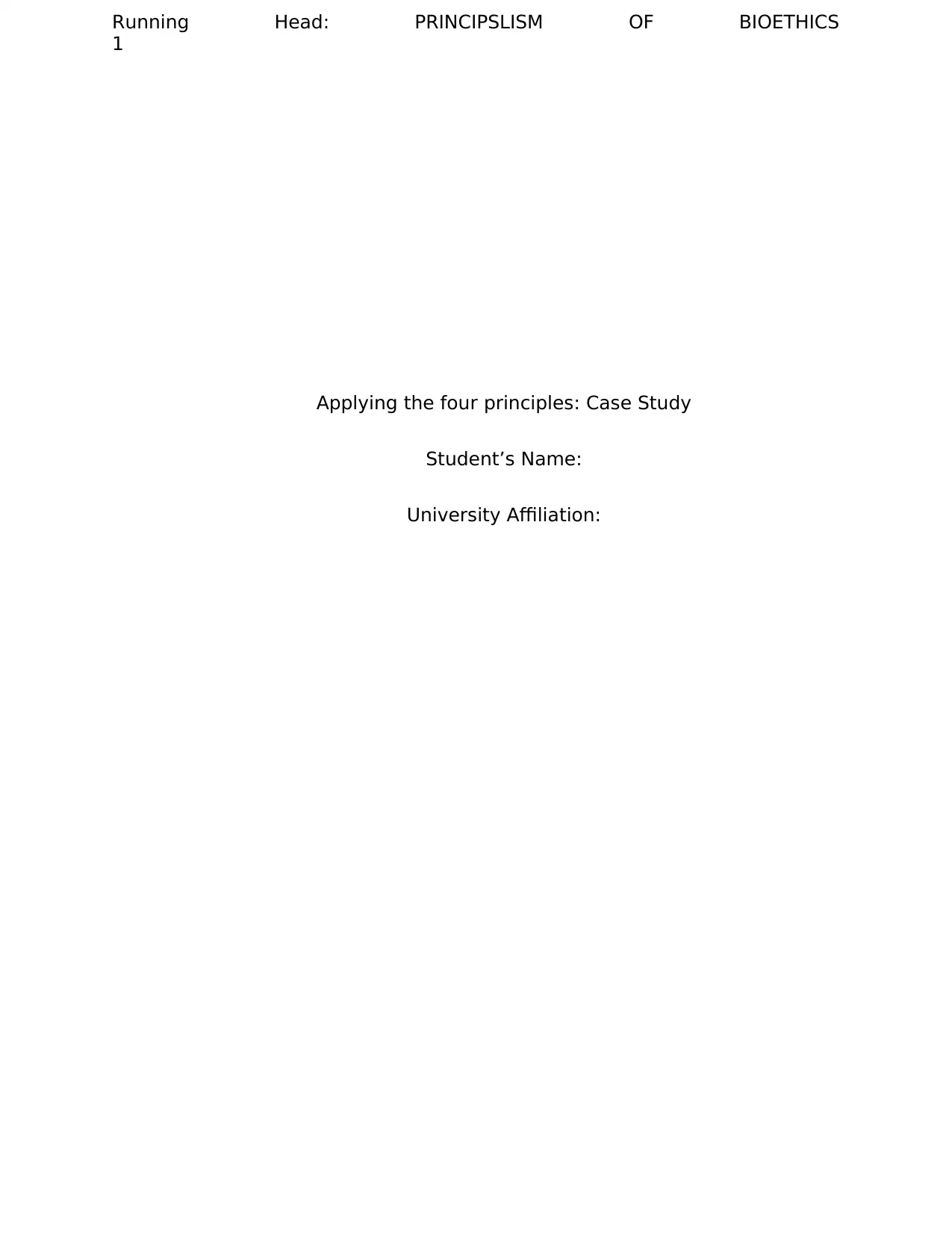
Running Head: PRINCIPSLISM OF BIOETHICS
1
Applying the four principles: Case Study
Student’s Name:
University Affiliation:
1
Applying the four principles: Case Study
Student’s Name:
University Affiliation:
Paraphrase This Document
Need a fresh take? Get an instant paraphrase of this document with our AI Paraphraser

Running Head: PRINCIPSLISM OF BIOETHICS
2
INTRODUCTION
Principalism encompasses the four bioethical approaches which aim at
ensuring the wellbeing of patients while causing no harm and considering
the need. In the ancient days upon competition of medical school, a
practitioner was to take an oath of Hippocrates known as the father of
medicine to protect life and never to administer a drug that could cause
harm to a patient. However, with the advancement in the medical field, it
was only ideal for the development of the four-principle approach to ensure
patients are protected.
Data on the four principles based on the case study
Medical indications
Beneficence and
Nonmaleficence
Patient Preference
Autonomy
1. Beneficence
Due to James condition of
acute glomerulonephritis
accompanied with elevated
blood pressure together with
fluid buildup, an immediate
dialysis was required to help
stabilize his condition.
Upon return from the healing
service, James parents were
forced to allow a dialysis be
done since his condition had
seriously deteriorated
James condition stabilized as a
result of the dialysis however
a kidney transplant was
required within the year.
2. Nonmaleficence
In the case study Mike
struggles to decide whether to
have Samuel donate a kidney
1. Autonomy
Mike and Joanne decide to
forego the dialysis and place
their faith in God. This
decision was made after they
witnessed a close friend who
had suffered from stroke gain
mobility after she was prayed
for in a healing service.
They also agree to return to
the hospital within the week in
the hopes James would have
been healed from the healing
service.
2
INTRODUCTION
Principalism encompasses the four bioethical approaches which aim at
ensuring the wellbeing of patients while causing no harm and considering
the need. In the ancient days upon competition of medical school, a
practitioner was to take an oath of Hippocrates known as the father of
medicine to protect life and never to administer a drug that could cause
harm to a patient. However, with the advancement in the medical field, it
was only ideal for the development of the four-principle approach to ensure
patients are protected.
Data on the four principles based on the case study
Medical indications
Beneficence and
Nonmaleficence
Patient Preference
Autonomy
1. Beneficence
Due to James condition of
acute glomerulonephritis
accompanied with elevated
blood pressure together with
fluid buildup, an immediate
dialysis was required to help
stabilize his condition.
Upon return from the healing
service, James parents were
forced to allow a dialysis be
done since his condition had
seriously deteriorated
James condition stabilized as a
result of the dialysis however
a kidney transplant was
required within the year.
2. Nonmaleficence
In the case study Mike
struggles to decide whether to
have Samuel donate a kidney
1. Autonomy
Mike and Joanne decide to
forego the dialysis and place
their faith in God. This
decision was made after they
witnessed a close friend who
had suffered from stroke gain
mobility after she was prayed
for in a healing service.
They also agree to return to
the hospital within the week in
the hopes James would have
been healed from the healing
service.
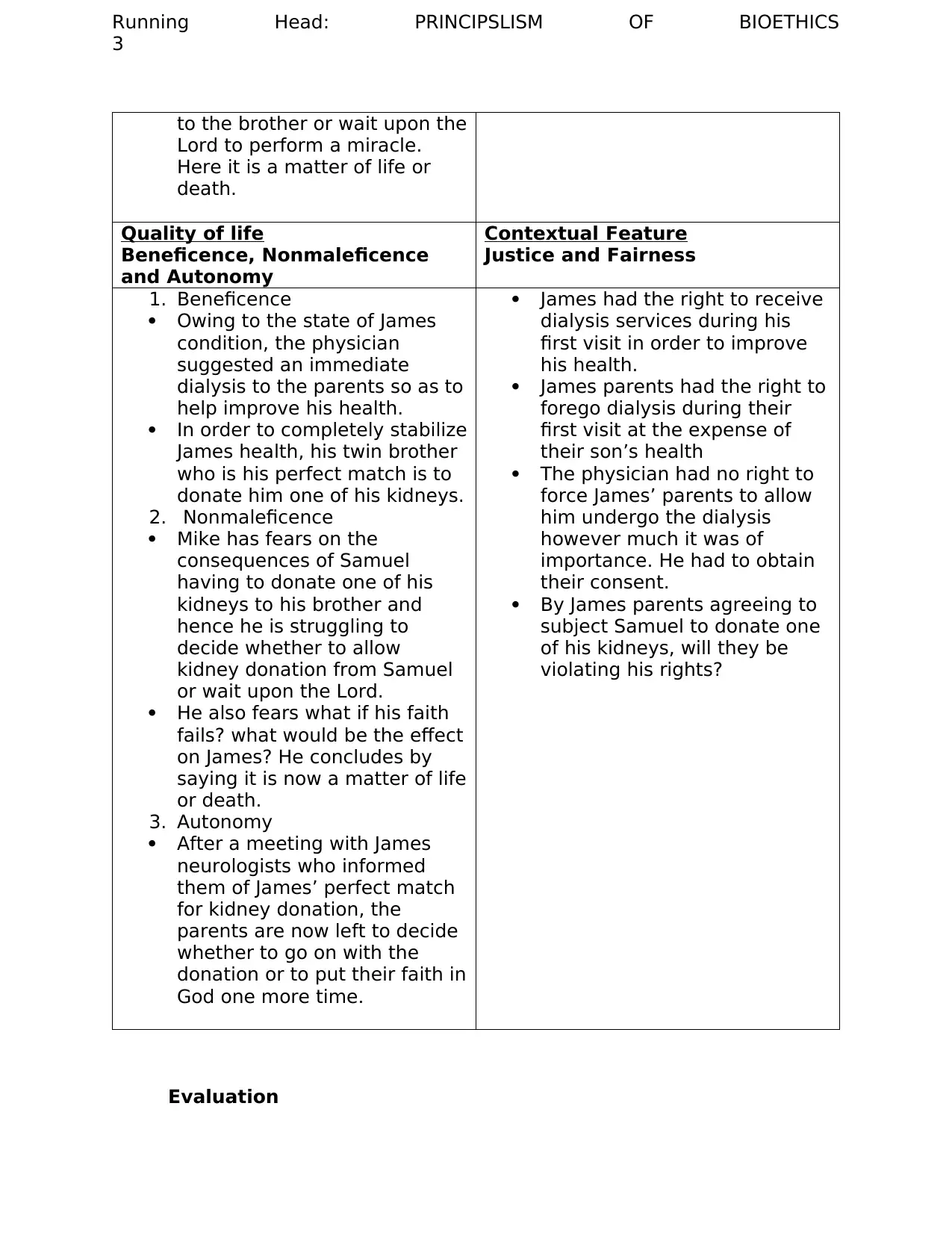
Running Head: PRINCIPSLISM OF BIOETHICS
3
to the brother or wait upon the
Lord to perform a miracle.
Here it is a matter of life or
death.
Quality of life
Beneficence, Nonmaleficence
and Autonomy
Contextual Feature
Justice and Fairness
1. Beneficence
Owing to the state of James
condition, the physician
suggested an immediate
dialysis to the parents so as to
help improve his health.
In order to completely stabilize
James health, his twin brother
who is his perfect match is to
donate him one of his kidneys.
2. Nonmaleficence
Mike has fears on the
consequences of Samuel
having to donate one of his
kidneys to his brother and
hence he is struggling to
decide whether to allow
kidney donation from Samuel
or wait upon the Lord.
He also fears what if his faith
fails? what would be the effect
on James? He concludes by
saying it is now a matter of life
or death.
3. Autonomy
After a meeting with James
neurologists who informed
them of James’ perfect match
for kidney donation, the
parents are now left to decide
whether to go on with the
donation or to put their faith in
God one more time.
James had the right to receive
dialysis services during his
first visit in order to improve
his health.
James parents had the right to
forego dialysis during their
first visit at the expense of
their son’s health
The physician had no right to
force James’ parents to allow
him undergo the dialysis
however much it was of
importance. He had to obtain
their consent.
By James parents agreeing to
subject Samuel to donate one
of his kidneys, will they be
violating his rights?
Evaluation
3
to the brother or wait upon the
Lord to perform a miracle.
Here it is a matter of life or
death.
Quality of life
Beneficence, Nonmaleficence
and Autonomy
Contextual Feature
Justice and Fairness
1. Beneficence
Owing to the state of James
condition, the physician
suggested an immediate
dialysis to the parents so as to
help improve his health.
In order to completely stabilize
James health, his twin brother
who is his perfect match is to
donate him one of his kidneys.
2. Nonmaleficence
Mike has fears on the
consequences of Samuel
having to donate one of his
kidneys to his brother and
hence he is struggling to
decide whether to allow
kidney donation from Samuel
or wait upon the Lord.
He also fears what if his faith
fails? what would be the effect
on James? He concludes by
saying it is now a matter of life
or death.
3. Autonomy
After a meeting with James
neurologists who informed
them of James’ perfect match
for kidney donation, the
parents are now left to decide
whether to go on with the
donation or to put their faith in
God one more time.
James had the right to receive
dialysis services during his
first visit in order to improve
his health.
James parents had the right to
forego dialysis during their
first visit at the expense of
their son’s health
The physician had no right to
force James’ parents to allow
him undergo the dialysis
however much it was of
importance. He had to obtain
their consent.
By James parents agreeing to
subject Samuel to donate one
of his kidneys, will they be
violating his rights?
Evaluation
⊘ This is a preview!⊘
Do you want full access?
Subscribe today to unlock all pages.

Trusted by 1+ million students worldwide
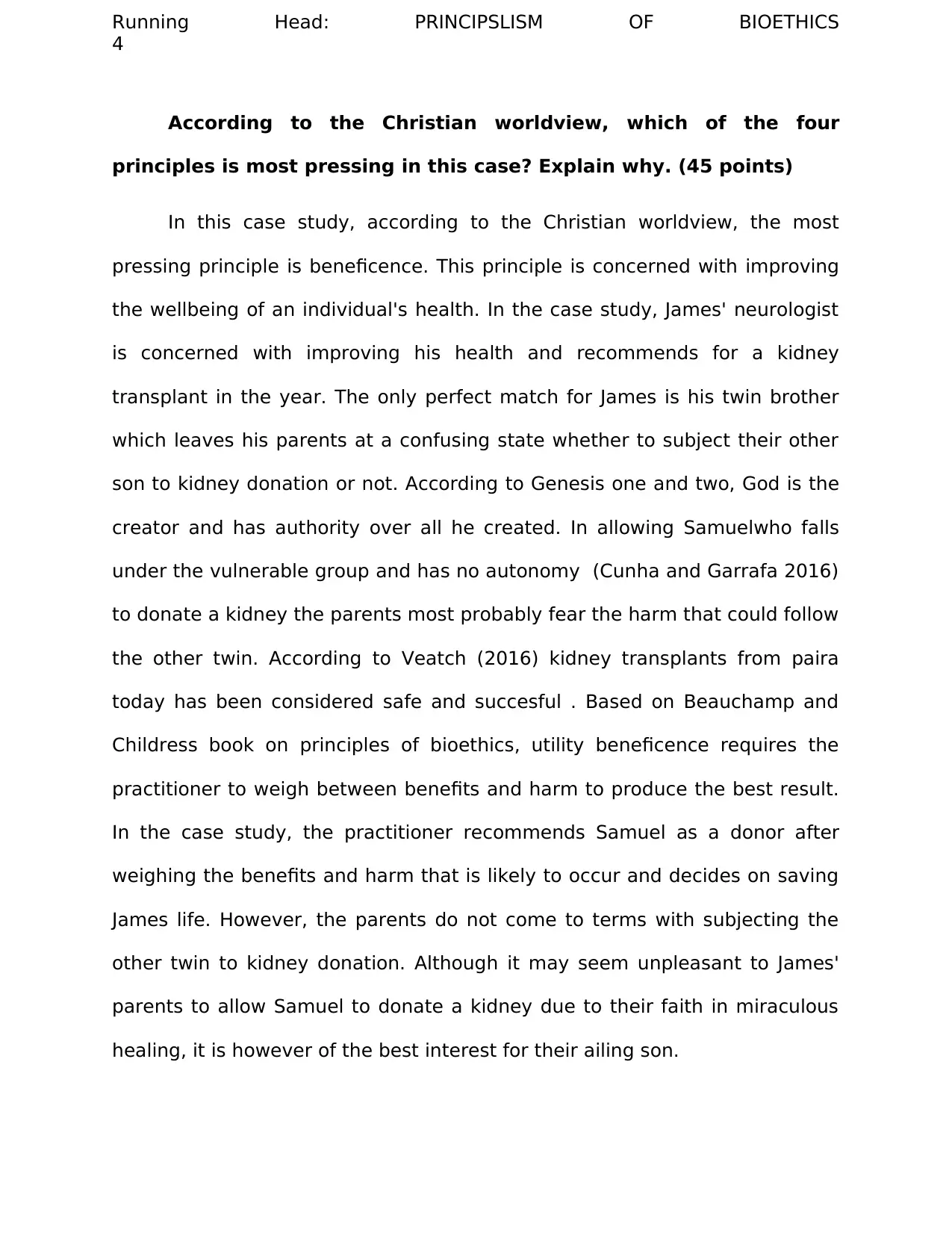
Running Head: PRINCIPSLISM OF BIOETHICS
4
According to the Christian worldview, which of the four
principles is most pressing in this case? Explain why. (45 points)
In this case study, according to the Christian worldview, the most
pressing principle is beneficence. This principle is concerned with improving
the wellbeing of an individual's health. In the case study, James' neurologist
is concerned with improving his health and recommends for a kidney
transplant in the year. The only perfect match for James is his twin brother
which leaves his parents at a confusing state whether to subject their other
son to kidney donation or not. According to Genesis one and two, God is the
creator and has authority over all he created. In allowing Samuelwho falls
under the vulnerable group and has no autonomy (Cunha and Garrafa 2016)
to donate a kidney the parents most probably fear the harm that could follow
the other twin. According to Veatch (2016) kidney transplants from paira
today has been considered safe and succesful . Based on Beauchamp and
Childress book on principles of bioethics, utility beneficence requires the
practitioner to weigh between benefits and harm to produce the best result.
In the case study, the practitioner recommends Samuel as a donor after
weighing the benefits and harm that is likely to occur and decides on saving
James life. However, the parents do not come to terms with subjecting the
other twin to kidney donation. Although it may seem unpleasant to James'
parents to allow Samuel to donate a kidney due to their faith in miraculous
healing, it is however of the best interest for their ailing son.
4
According to the Christian worldview, which of the four
principles is most pressing in this case? Explain why. (45 points)
In this case study, according to the Christian worldview, the most
pressing principle is beneficence. This principle is concerned with improving
the wellbeing of an individual's health. In the case study, James' neurologist
is concerned with improving his health and recommends for a kidney
transplant in the year. The only perfect match for James is his twin brother
which leaves his parents at a confusing state whether to subject their other
son to kidney donation or not. According to Genesis one and two, God is the
creator and has authority over all he created. In allowing Samuelwho falls
under the vulnerable group and has no autonomy (Cunha and Garrafa 2016)
to donate a kidney the parents most probably fear the harm that could follow
the other twin. According to Veatch (2016) kidney transplants from paira
today has been considered safe and succesful . Based on Beauchamp and
Childress book on principles of bioethics, utility beneficence requires the
practitioner to weigh between benefits and harm to produce the best result.
In the case study, the practitioner recommends Samuel as a donor after
weighing the benefits and harm that is likely to occur and decides on saving
James life. However, the parents do not come to terms with subjecting the
other twin to kidney donation. Although it may seem unpleasant to James'
parents to allow Samuel to donate a kidney due to their faith in miraculous
healing, it is however of the best interest for their ailing son.
Paraphrase This Document
Need a fresh take? Get an instant paraphrase of this document with our AI Paraphraser
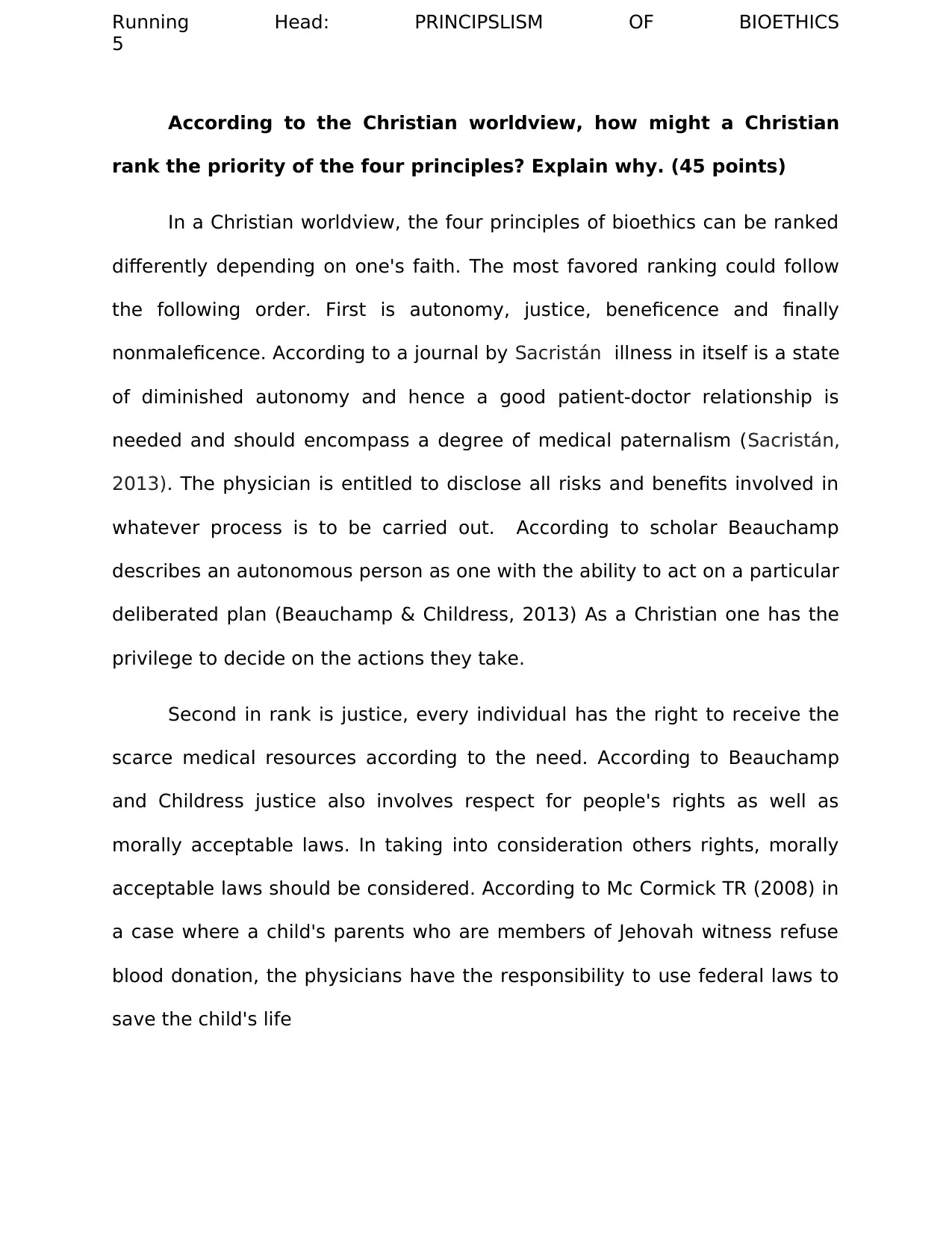
Running Head: PRINCIPSLISM OF BIOETHICS
5
According to the Christian worldview, how might a Christian
rank the priority of the four principles? Explain why. (45 points)
In a Christian worldview, the four principles of bioethics can be ranked
differently depending on one's faith. The most favored ranking could follow
the following order. First is autonomy, justice, beneficence and finally
nonmaleficence. According to a journal by Sacristán illness in itself is a state
of diminished autonomy and hence a good patient-doctor relationship is
needed and should encompass a degree of medical paternalism (Sacristán,
2013). The physician is entitled to disclose all risks and benefits involved in
whatever process is to be carried out. According to scholar Beauchamp
describes an autonomous person as one with the ability to act on a particular
deliberated plan (Beauchamp & Childress, 2013) As a Christian one has the
privilege to decide on the actions they take.
Second in rank is justice, every individual has the right to receive the
scarce medical resources according to the need. According to Beauchamp
and Childress justice also involves respect for people's rights as well as
morally acceptable laws. In taking into consideration others rights, morally
acceptable laws should be considered. According to Mc Cormick TR (2008) in
a case where a child's parents who are members of Jehovah witness refuse
blood donation, the physicians have the responsibility to use federal laws to
save the child's life
5
According to the Christian worldview, how might a Christian
rank the priority of the four principles? Explain why. (45 points)
In a Christian worldview, the four principles of bioethics can be ranked
differently depending on one's faith. The most favored ranking could follow
the following order. First is autonomy, justice, beneficence and finally
nonmaleficence. According to a journal by Sacristán illness in itself is a state
of diminished autonomy and hence a good patient-doctor relationship is
needed and should encompass a degree of medical paternalism (Sacristán,
2013). The physician is entitled to disclose all risks and benefits involved in
whatever process is to be carried out. According to scholar Beauchamp
describes an autonomous person as one with the ability to act on a particular
deliberated plan (Beauchamp & Childress, 2013) As a Christian one has the
privilege to decide on the actions they take.
Second in rank is justice, every individual has the right to receive the
scarce medical resources according to the need. According to Beauchamp
and Childress justice also involves respect for people's rights as well as
morally acceptable laws. In taking into consideration others rights, morally
acceptable laws should be considered. According to Mc Cormick TR (2008) in
a case where a child's parents who are members of Jehovah witness refuse
blood donation, the physicians have the responsibility to use federal laws to
save the child's life
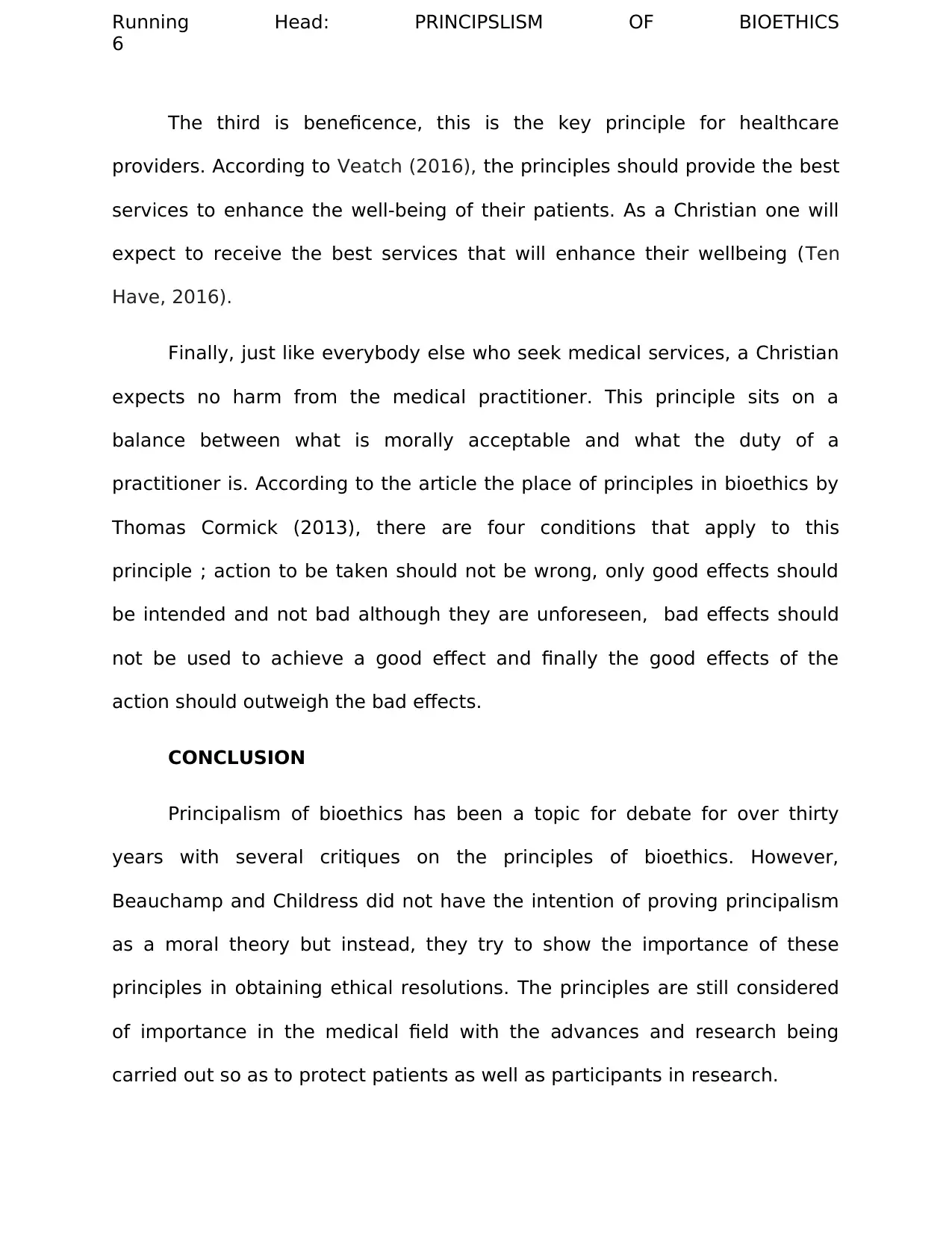
Running Head: PRINCIPSLISM OF BIOETHICS
6
The third is beneficence, this is the key principle for healthcare
providers. According to Veatch (2016), the principles should provide the best
services to enhance the well-being of their patients. As a Christian one will
expect to receive the best services that will enhance their wellbeing (Ten
Have, 2016).
Finally, just like everybody else who seek medical services, a Christian
expects no harm from the medical practitioner. This principle sits on a
balance between what is morally acceptable and what the duty of a
practitioner is. According to the article the place of principles in bioethics by
Thomas Cormick (2013), there are four conditions that apply to this
principle ; action to be taken should not be wrong, only good effects should
be intended and not bad although they are unforeseen, bad effects should
not be used to achieve a good effect and finally the good effects of the
action should outweigh the bad effects.
CONCLUSION
Principalism of bioethics has been a topic for debate for over thirty
years with several critiques on the principles of bioethics. However,
Beauchamp and Childress did not have the intention of proving principalism
as a moral theory but instead, they try to show the importance of these
principles in obtaining ethical resolutions. The principles are still considered
of importance in the medical field with the advances and research being
carried out so as to protect patients as well as participants in research.
6
The third is beneficence, this is the key principle for healthcare
providers. According to Veatch (2016), the principles should provide the best
services to enhance the well-being of their patients. As a Christian one will
expect to receive the best services that will enhance their wellbeing (Ten
Have, 2016).
Finally, just like everybody else who seek medical services, a Christian
expects no harm from the medical practitioner. This principle sits on a
balance between what is morally acceptable and what the duty of a
practitioner is. According to the article the place of principles in bioethics by
Thomas Cormick (2013), there are four conditions that apply to this
principle ; action to be taken should not be wrong, only good effects should
be intended and not bad although they are unforeseen, bad effects should
not be used to achieve a good effect and finally the good effects of the
action should outweigh the bad effects.
CONCLUSION
Principalism of bioethics has been a topic for debate for over thirty
years with several critiques on the principles of bioethics. However,
Beauchamp and Childress did not have the intention of proving principalism
as a moral theory but instead, they try to show the importance of these
principles in obtaining ethical resolutions. The principles are still considered
of importance in the medical field with the advances and research being
carried out so as to protect patients as well as participants in research.
⊘ This is a preview!⊘
Do you want full access?
Subscribe today to unlock all pages.

Trusted by 1+ million students worldwide

Running Head: PRINCIPSLISM OF BIOETHICS
7
7
Paraphrase This Document
Need a fresh take? Get an instant paraphrase of this document with our AI Paraphraser

Running Head: PRINCIPSLISM OF BIOETHICS
8
REFERENCES
Beauchamp T, Childress J. (2013). Priciples of biomedical ethics. New York:
Oxford University Press.
Cunha, T., & Garrafa, V. (2016). Vulnerability: a key principle for global
bioethics?. Cambridge Quarterly of Healthcare Ethics, 25(2), 197-208.
Sacristán, J. A. (2013). Patient-centered medicine and patient-oriented
research: improving health outcomes for individual patients. BMC medical
informatics and decision making, 13(1), 6.
Ten Have, H. (2016). Vulnerability: challenging bioethics. Routledge.
Veatch, R. M. (2016). The basics of bioethics. Routledge.
McCormick, T. R. (2008). Ethical issues inherent to Jehovah's
Witnesses. Perioperative Nursing Clinics, 3(3), 253-258.
8
REFERENCES
Beauchamp T, Childress J. (2013). Priciples of biomedical ethics. New York:
Oxford University Press.
Cunha, T., & Garrafa, V. (2016). Vulnerability: a key principle for global
bioethics?. Cambridge Quarterly of Healthcare Ethics, 25(2), 197-208.
Sacristán, J. A. (2013). Patient-centered medicine and patient-oriented
research: improving health outcomes for individual patients. BMC medical
informatics and decision making, 13(1), 6.
Ten Have, H. (2016). Vulnerability: challenging bioethics. Routledge.
Veatch, R. M. (2016). The basics of bioethics. Routledge.
McCormick, T. R. (2008). Ethical issues inherent to Jehovah's
Witnesses. Perioperative Nursing Clinics, 3(3), 253-258.
1 out of 8
Related Documents
Your All-in-One AI-Powered Toolkit for Academic Success.
+13062052269
info@desklib.com
Available 24*7 on WhatsApp / Email
![[object Object]](/_next/static/media/star-bottom.7253800d.svg)
Unlock your academic potential
Copyright © 2020–2026 A2Z Services. All Rights Reserved. Developed and managed by ZUCOL.




